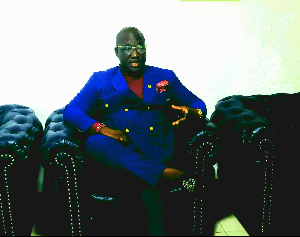- Home - News
- TWI News | TV
- Polls
- Year In Review
- News Archive
- Crime & Punishment
- Politics
- Regional
- Editorial
- Health
- Ghanaians Abroad
- Tabloid
- Africa
- Religion
- Election 2020
- Coronavirus
- News Videos | TV
- Photo Archives
- News Headlines
- Press Release
General News of Wednesday, 10 October 2001
Source: Rebecca Osei-Edwards, Koforidua
60% of pupils in primary schools can't read
ABOUT 60 per cent of pupils in primary schools in the country are unable to read and write, Professor J. Anamuah-Mensah, Principal of the University College of Education, Winneba (UCEW), has said.
He noted that only a percentage of pupils in Primary Six can exhibit adequate knowledge in English and Mathematics and described the situation as a daunting problem for the country’s education system.
The Principal was delivering a keynote address at the opening of the eighth annual Conference of District Directors of Education (CODDE) at Koforidua on Monday.
Under the theme: “The Challenges of Pre-Tertiary Education in the 21st Century,” the five-day conference brought together directors of education from all over the country, as well as heads of some secondary schools and other interest groups in the education sector.
Professor Anamuah-Mensah identified various problems, including lack of infrastructure, inadequate supply of professionally qualified teachers, imbalance between the content of school curriculum and the world of work, as well as inefficient resource allocation procedure as impeding the progress of pre-tertiary education in the country.
He pointed out that the current situation, where as much as 90 per cent of educational resources is allocated for the payment of salaries and only 10 per cent spent on non-salary expenditures is not good enough.
Besides, he noted that although the education system is decentralised, resource development is centralised, thereby impeding the operation of directories and called for a more serious look at the situation to salvage pre-tertiary education in the country.
Prof Anamuah-Mensah spoke about the challenge of introducing information technology in all schools in the country as part of efforts to reduce what he termed “the digital gap between the rural and urban schools”.
The principal further charged members of CODDE at the conference to come out with recommendations to ensure that the target set in the Free, Compulsory Universal Basic Education (FCUBE) programme to get all Ghanaian children of school-going age into school by the year 2005 is attained.
The Minister of State in-charge of Primary, Secondary and Girl-Child Education, Ms Christine Churcher, charged the participants to recommend a body to be in-charge of early childhood development in the country.
Currently, early childhood development is left in the hands of private owners, resulting in differences in scope and content of curriculum.
According to the minister, there is the need to take the foundations of education in the country more seriously, since that is where a child learns most of what takes him or her into adult life.
The Omanhene of the New Juaben Traditional Area, Daasebre Dr Oti-Boateng, on his part, identified lack of supply of learning and teaching materials, bad conditions of service, poor teaching and high cost of education, as some of the problems that need urgent attention to improve access and standards in pre-tertiary education.
He expressed particular concern about schools which charge fees in dollars, adding that “care must be taken not to create two classes in our society, with exorbitant school fees as the main discriminator”.
Earlier, in an address read on his behalf, Mr J. Yaw Oduro, President of CODDE, appealed to the Ministry of Education to accelerate the improvement of quality education in public schools to remove inequalities which lead to disparity in education delivery in the country.










